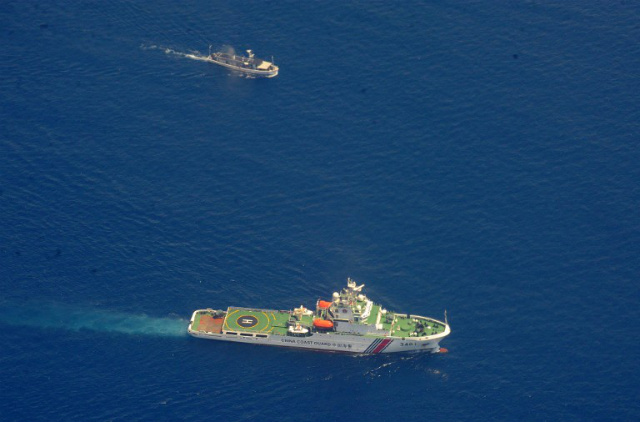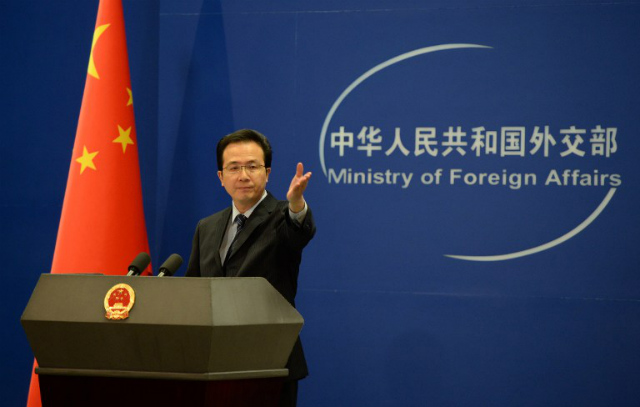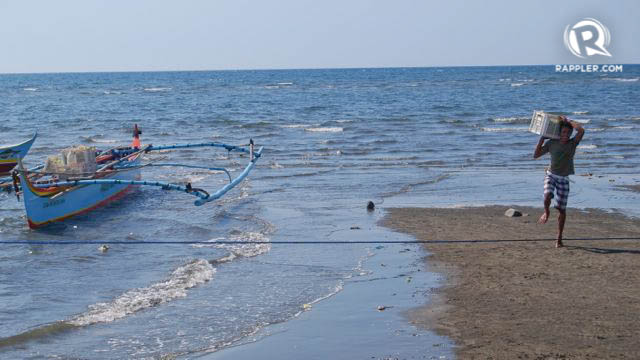SUMMARY
This is AI generated summarization, which may have errors. For context, always refer to the full article.

MANILA, Philippines – China rejected the historic pleading filed by the Philippines on Sunday, March 30, claiming that the arbitral tribunal at the Permanent Court of Arbitration has no right to hear the case.
In rejecting the Philippines’ nearly 4,000-page written pleading, China also asserted that its position on the West Philippine Sea (South China Sea) dispute “is solidly based on international law.”
“No matter how the Philippine memorial is packaged, the direct cause of the dispute between China and the Philippines is the latter’s illegal occupation of some of China’s islands and reefs in the South China Sea,” Chinese Foreign Ministry spokesman Hong Lei said in a statement hours after the Philippines filed the pleading.
“At the heart of the matter are the disputes between the two sides on the sovereignty over islands and reefs, and delimitation of maritime boundaries. Yet disputes such as these have already been excluded from arbitration procedures through a declaration made by China in 2006 pursuant to the UN Convention on the Law of the Sea (UNCLOS),” Hong said.
He added, “In this context, China’s rejection of the Philippines’ submission for arbitration is solidly based on international law, and China’s lawful rights as a party to UNCLOS should be truly respected.”
In striving to prove it is not an international outlaw, China, in sum, raised two points:
-
The disputes involve land, which is not covered by UNCLOS; and
-
The disputes involve the delimitation of maritime boundaries, over which it rejected arbitral proceedings in a declaration under UNCLOS in 2006
China’s arguments against the tribunal’s jurisdiction remain a major hurdle for the Philippines.
PH vs ‘unlawful activities’

China’s first argument seeks its basis in the nature of UNCLOS: It is, by its name alone, a “law of the sea.” It covers disputes over seas, not territories.
Its second argument uses a declaration China made in 2006.
In this declaration under UNCLOS, China rejects arbitral proceedings over certain disputes, such as those involving sea boundary delimitations. In a nutshell, such disputes concern overlapping seas or maritime zones.
The UNCLOS allows such exclusions.
The Philippines says it does not seek to determine “which party enjoys sovereignty over the islands claimed by both of them.” For the Philippines, the case is not about land but water.
In its Notification and Statement of Claim, it also acknowledges the exceptions China invoked. The Philippines’ case excludes such disputes.
What the Philippines seeks is, for one, to invalidate China’s expansive claims over the West Philippine Sea. In particular, it requests the arbitral tribunal to declare China’s 9-dash line, a demarcation mark to claim the disputed sea, as contrary to UNCLOS.
It also wants China to desist, among others, from “unlawful activities” within Philippine waters.
‘No overlapping EEZs’

Philippine Supreme Court Associate Justice Antonio Carpio explained his country’s position.
In a recent speech, he said disputes on maritime boundary delimitation arise from overlapping exclusive economic zones (EEZs), among others.
The EEZ is an area 200 nautical miles from a country’s baselines, or edges, within which a state has the sovereign rights to explore and exploit, and conserve and manage natural resources, among others.
It has everything to do about the right of Filipino fishermen to fish in the West Philippine Sea.
While the EEZ lies at the heart of the Philippines’ argument, Carpio said the arbitral tribunal has jurisdiction over the historic case. China, for one, “has no EEZ that overlaps with the Philippines’ EEZ in the Scarborough area.” (READ: What’s at stake in our case vs China)
He explained: “China’s baselines are either along the coast of Hainan Island, which is 580 NM from Luzon, or along the coast of mainland China, which is 485 NM miles from the Zambales coastline in Luzon facing Scarborough Shoal. Even if you grant the Chinese-held Paracels an EEZ, the Paracels are about 480 NM from Luzon. To have overlapping EEZs, the distance between the opposite baselines must be less than 400 NM. In the Scarborough area, there is no baseline in Luzon where its distance from the nearest Chinese baseline is less than 400 NM.”
David vs Goliath

In the face of China’s objections, Manila filed its 10-volume pleading, called a memorial, to end decades of alleged bullying by Beijing.
The Philippines sent the memorial incidentally after China on Saturday, March 29, harassed a Filipino ship again.
“With firm conviction, the ultimate purpose of the memorial is our national interest. It is about defending what is legitimately ours. It is about securing our children’s future. It is about guaranteeing freedom of navigation for all nations. It is about helping to preserve regional peace, security, and stability,” Philippine Foreign Secretary Albert del Rosario said in a media briefing.
“And finally,” Del Rosario said, “it is about seeking not just any kind of resolution but a just and durable solution grounded on international law.”
The United States, the Philippines’ ally, said other countries should respect the Philippines’ right to resolve maritime disputes under UNCLOS.
“We hope that this case serves to provide legal certainty and compliance with the international law of the sea,” US State Department spokesperson Marie Harf said Sunday.
The Philippines considers the historic case as its last resort, after it exhausted more than 17 years of dialogue. (READ: PH slaps China with 8 facts vs ‘baseless’ claim)
Del Rosario said in 2013, “The Philippines has always asserted that international law including UNCLOS will be the great equalizer in resolving this dispute over the West Philippine Sea.” – Rappler.com
See related stories:
- PH slaps China with 8 facts vs ‘baseless’ claim
- PH faces major hurdle in China case
- What’s at stake in our case vs China
- PH readies ‘convincing evidence’ vs China
- PH strikes back, files pleading vs China
More stories on this topic here.
Add a comment
How does this make you feel?
There are no comments yet. Add your comment to start the conversation.